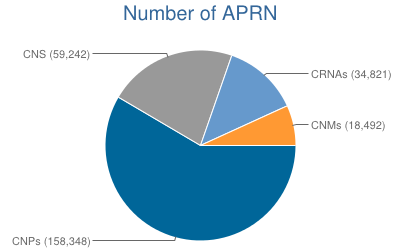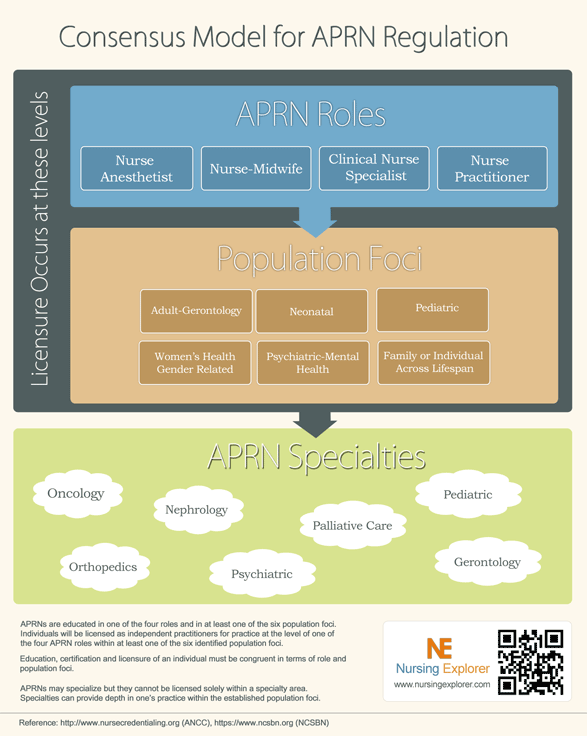Advanced Practice Registered Nurse
 Advance practice nurses are RNs with education and training of at least a Master’s degree. The need for this type of healthcare provider has really grown especially in rural areas where there are a limited number of physicians. Nurse Practitioners can work in clinics and provide much of the same services a physician can offer in these settings. Because nurse practitioners are registered nurses, they will also specialize in educating patients. This is something that nurses do much better than physicians. Many physicians have partnered with APNs as well.
Advance practice nurses are RNs with education and training of at least a Master’s degree. The need for this type of healthcare provider has really grown especially in rural areas where there are a limited number of physicians. Nurse Practitioners can work in clinics and provide much of the same services a physician can offer in these settings. Because nurse practitioners are registered nurses, they will also specialize in educating patients. This is something that nurses do much better than physicians. Many physicians have partnered with APNs as well.
Advanced Practice Registered Nurses can function as a direct care provider, consultant, case manager, educator or researcher. They care for a specific population of patients under four roles:
- Nurse Practitioner
- Certified Nurse Midwife
- Certified Registered Nurse Anesthetist
- Clinical Nurse Specialist
Most of these nurses have prescriptive authority and some states allow them to practice without collaborating or being supervised by a physician. Studies have been done that have proven that care provided by an APNs is equal to or comparable to care given by physicians. And it is done at a lower cost. Generally, APRNs work in hospitals and clinics. Those who are in public health might have a need to travel to places such as schools, community centers or patients' homes.
The national health care system has a great need for APRNs as they serve a vital role in upping the level of service or transforming primary care, chronic care management, preventive care and, eventually, wellness.
Education Requirements
If you are interested in the career of advanced practice nurse, getting your RN license is the first step. After that, you need to complete the bachelor program or do one of the accelerated nursing programs to reach your goal of MSN. MSN programs usually require 500 to 700 hours of supervised practice to earn the degree and sit for the certification exam. APNs use their advanced education in pharmacology, assessment, and expertise in many specialized areas.
The MSN degree prepares students for leadership roles. The traditional "stepping stone" path is RN to BSN to MSN, but there are mobility or bridge programs for nurses whose highest level of education is an Associate degree in Nursing or diploma from an accredited program which allows them to skip the BSN degree and go straight for the master’s degree. Prior college credits will transfer towards the master's degree and you will not be required to sit for the NCLEX-RN exam.
Most MSN programs are specially created for busy RNs with family and career obligations. Students can complete the programs part time, full time or online. Specialty programs are often given the same day or on weekends each semester which makes it easier to fit into busy schedules. When you apply for the MSN program, you will typically be required to apply for a specific specialty track.
Minimum Education Requirement for APRN
Some states may not ask for a graduate degree but they will soon change that as the new APRN consensus model gets implemented. While many student nurses are now reacting to the proposal of AACN (American Association of Colleges of Nursing) and NCSBN to up the level of educational requirement for APRNs from MSN to a doctoral degree, current APRNs are happy about the grandfather exception that is extended to them. This exception is great news because DNP, as an entry-level requirement, is not applicable to current, practicing APRNs. By the year 2015, the entry-level education for APRN will be set at DNP degree.
Job Description & Duties
Generally, these are the job description and scope of practice of a typical APRN:
- Sit down with, teach and counsel patients regarding the status of their health; and in the case of patients that are no longer able to do these, you need to explain their health situation with their families.
- If you can work individually (meaning, you are employed outside of hospitals), you can provide consultancy services.
- Coordinate patient care with other members of the healthcare team (physicians and fellow nurses).
- Refer the patient to the right physician and health care provider.
- If in collaboration with a licensed physician, APRNs are also allowed to prescribe, administer, and dispense medications; they are also allowed to recommend therapeutic devices. Presently, there is a call to update the laws and rules in medical prescription. It is asking for full permission to be given to APRNs but that has yet to be set.
Job Outlook and Salary
The salary range for APRNs is from $56,000 to $111,177 with the hourly rate recorded at $44.51 (data according to www.payscale.com updated March 14, 2013). The median bonus is at $487.96. Additional benefits might include educational assistance, child care, and flexible work schedules.
Figure 1.1 shows the number of certified nursing practitioners, certified nurse specialists, certified registered nurse anesthetists and certified nurse midwives in the year 2008. The data shows a huge number of practicing RNs with specialties back then; and with an increasing trend forecasted for every year since then, you are ascertained that a job will be waiting for you by the time you finish your specialized program.

Figure 1.1 This is a sample survey by the AARP Public Policy Institute and the National Sample Survey of RNs
Carrie Cronkite BSN, RN
Carrie has been a registered nurse for 14 years and works at a local hemodialysis outpatient center. She has experience in cardiac nursing, orthopedic rehabilitation and [...]

